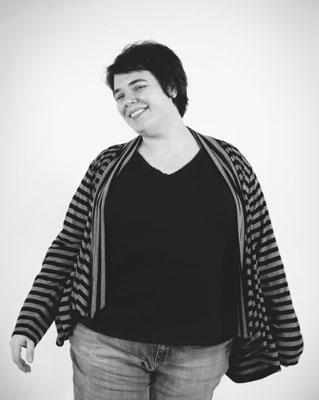Two hundred pairs of eyes in are fixed on Laurie Chancey. She’s teaching Introduction to Sociology to a room full of students who hold a degree she doesn’t.A
Chancey, a 31-year-old sociology instructor, is working on her dissertation and hopes to obtain a doctorate degree this year. But she doesn’t have a high school diploma, GED or any other equivalent.
Growing up, Chancey received her education without structure and without teachers. No curriculum, no grades, no homework. She was never told what to do or how to spend her time. She learned only what she wanted to learn.
The concept is called unschooling, or child-led learning. Chancey said the philosophy behind unschooling is that children are natural learners and they will do so without being forced. Unschoolers believe that children learn best by simply following their interests.
Chancey said her background is what led her to develop a love for sociology.
She defines sociology as observing social life from a detached perspective, which is how she felt growing up — looking through the window as friends and peers experienced the institution.
“Every single thing I did has led me to this point. And that was the theory behind unschooling,” she said.
Chancey said teaching is her passion and she plans on spending the rest of her life as a sociology professor. She says her background makes her a good college instructor, and it helps her teach in a way that resonates with her students.
“I was doe-eyed and fascinated by everything in college, and I try to recreate that in the classroom,” Chancey said.
With her iPad in hand, she shows music videos and pop culture examples, and works to make her class continuously fun. She tries to prove to her students why specific information is valuable. She doesn’t feel the need to be an authority figure.
During her childhood, Chancey never had a typical school day in her Lake Charles, La. home.
She didn’t have a bedtime or a specific time to wake up. Often, she’d bid her mother good night at the same time her mother would wake up. Some days Chancey immersed herself in research, and other days she just played video games.
“I’d go months at a time without doing anything productive, but it was always my mom’s philosophy that ‘whatever Laurie’s focused on, whatever she’s interested in, she must be getting something out of it, so let’s leave her alone and let her do it,’” Chancey said casually as she leaned back in her office chair.
Chancey’s mother, Valerie Fitzenreiter, said she decided on unschooling after reading the book “Summerhill School” during her pregnancy. The book followed the titular English private school run like a democracy.
The story of Summerhill, along with her experience of being “bored to death” in a traditional school environment, convinced Fitzenreiter that unschooling was the only way for her child to learn.
Laurie’s father, Arthur Chancey, supported Fitzenreiter’s ideology and often worked overtime so the family could afford for Fitzenreiter to stay home during the day.
Fitzenreiter said it was important for Chancey to be in charge of her own life. She believed unschooling was the avenue for raising an independent, individualized child, free of conformity.
“It’s just not fair to make a child go to school. To me, it was unschool or nothing,” Fitzenreiter said. “I didn’t want her to fit into society strictly because that’s how it’s supposed to be.”
Since Chancey mainly learned through practical experience, she says there are several gaps in her knowledge base. She learned math from cooking and balancing her parents’ checkbook, but she doesn’t know the multiplication table and she can’t do long division.
She never learned how to write in cursive, she hasn’t read classic literature and she struggles in history and geography.
Chancey and Fitzenreiter often had to cope with strangers and other parents who didn’t understand Chancey’s schooling situation. They often lied and said she was home-schooled.
Fitzenreiter’s sister, a first grade teacher, thought Fitzenreiter was ruining Chancey’s life by not enrolling her in school.
“I respect what [my sister] does … but our theories on child-rearing are pretty much going off in different directions,” Fitzenreiter said.
A Sonic carhop once asked Fitzenreiter, “Aren’t you scared she’s gonna grow up to be stupid?” after Fitzenreiter explained Chancey was home-schooled when the carhop questioned why she wasn’t at school.
The incident at Sonic wasn’t the only one of its kind. Chancey grew up batting away strangers’ questions and fending off their judgmental looks.
When Chancey was about six years old, her parents received a letter from the school board declaring her truant, or unauthorized to be absent from school, since she wasn’t in school or formally home-schooled. Chancey’s family feared she would be taken away.
“I had a place to go where if it came down to it … I would have taken her and gone there, and as far as I know no one could find me,” Fitzenreiter said. “I would’ve done what I had to because it was very important for me to raise her in freedom.”
For a few years, the family legally registered as a home school, but became disenchanted by the mandatory annual paperwork and found a new solution.
Fitzenreiter learned that at the time, if she registered with the state as a private school, the state would have no say in the school’s curriculum.
So when Chancey was 12 years old, she began attending Holt-Neil High School. She was registered as the student, her mother the teacher and her father the principal.
After working a minimum-wage job at a video store when she turned 18, and fearing she would get stuck in a simple job for the rest of her life, Chancey shocked her parents and decided she needed to go to college.
“That was going to be my avenue into the world.”
Chancey enrolled in McNeese University at 18 years old. She was accepted into the Lake Charles school solely based on her ACT score. Her composite score was a 25 — five points above Louisiana’s average. She had a 30 in English and a 16 in math.
According to McNeese’s freshman admission requirements, home-schooled students may be admitted if they have a minimum 2.35 high school GPA and minimum ACT score of 23.
Chancey said she told the McNeese counselors she was home-schooled and had a 4.0 GPA, and even though she didn’t have a diploma or transcript, she was accepted into the university.
Though Chancey bristles at the thought of authority, she thrived in college. She still felt independent since she could choose the classes she wanted to take. And because she hadn’t spent 12 years of her youth in an educational institution, she said she wasn’t burnt out by the time she started college.
Chancey got her first B in her graduating semester, but otherwise maintained a 4.0 grade point average throughout her time at McNeese.
But Chancey said her radical unschooling lifestyle brought about some long-term socialization issues.
As an only child, Chancey spent most of her time with her mother. She had friends from her neighborhood and cousins she played with, but for the most part, Chancey grew up without a peer group.
She matter-of-factly said she exudes a level of social awkwardness and hasn’t figured out the mechanics of meeting people and maintaining relationships.
Fitzenreiter said ensuring Chancey received adequate socialization was her greatest shortfall and regret throughout the unschooling process.
Hanna Smith, a photography senior in one of Chancey’s classes, struggled to find the right way to describe her teaching style, but affirmed it’s noticeably different from other instructors she’s had.
“She’s much more free-spirited,” Smith said.
Paris LaMotte, a sociology sophomore, was enrolled in Chancey’s introduction to sociology class in fall 2010, and said Chancey is still his favorite instructor.
“Laurie Chancey is the shit,” LaMotte said. “Since I’ve been in college, no other class has caught my attention like hers did.”
LaMotte said Chancey’s teaching style is unique and she keeps her class interesting by demonstrating lessons through a variety of media outlets — even a “South Park” episode can be a relevant educational example.
Chancey’s accomplishments are enough evidence to prove that unschooling was effective for her. But she says she wouldn’t do things the same way if she has children.
“My parents let me do what I wanted, but I think kids don’t always know what’s best for them. … Some decisions need to be made in the best interests of the kid.”
She said she would still select an alternative schooling method with a child-led focus, but she said more structure and social interaction are needed.
“I’m grateful for who I am now, so I wouldn’t say that I regret their decision at all. It was a cool, interesting way to grow up and left me with a lot of freedom,” she said. “But I don’t think I would do it the same way.”






